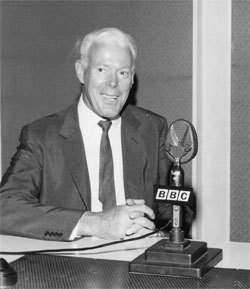Self-help June 1987
Trevor Leggett was head of the Japanese Department of the BBC.

This is one of his broadcasts to Japan
Zubari for June 1987
Hello listeners! Today I want to say something about the British sense of humour.
First, let me ask a question: Do you think that a maxim of conduct is more effective if it is presented with a little humour, or do you think that humour takes away from the seriousness of the maxim?
I will give three examples of the same piece of advice, presented in different ways. They are examples of praying to Heaven for help.
The first is a Greek traditional story. A poor man was gathering wood in the mountains. He made a big pile of the wood, and then he had to carry it down, on his back. Suddenly, he felt very tired. So he prayed to the God of Strength, Hercules, to help him. But there was no answer. He suddenly felt angry. He resolutely picked up the load himself on his back, and shouted: “I will do it by myself!” He set off, staggering under the load. Suddenly, Hercules was beside him. Hercules held out a finger under the load, and it became very light. Hercules said: “I help those who help themselves.”
This is a good story, but it has no humour in it.
The next example of the same thing is from Mohammedanism. There is a tradition that a man said to Mohammad: “In the evening on a journey, when we make camp, we take the loads off the camels and give them food and water. We then tie them by a leg to a post, so that they do not stray away from the camp. But a good Moslem perhaps ought not to do this: should he not trust in God to protect his camels? To tie the camel’s leg shows that he is not trusting in God.”
Mohammad replied: “Tie the camel’s leg, and then trust and then trust in God.” This is the same teaching but there is a little humour in it. Mohammad was saying: “Do all that you yourself can, and then trust in God. You cannot expect that God will do what you can do yourself.” Tie the camel’s leg, and then trust in God.
Well, recently in Wales, which is a very Christian part of Britain, I heard this humorous story: A devout Christian lived in a valley. One year there was a flood. The water rose higher and higher, and finally he had to take refuge on the roof of his house, like some of the neighbouring householders of the village. But he was not frightened. He thought: ‘God will stop the flood, and the water will go down. God will help me, because I have always been a good Christian.’
He saw a small empty boat drifting by, but he did not get into it. He thought: ‘I trust in God.’
Then some men in a rowing-boat came round, to rescue the stranded villagers. But this man would not get in the rowing boat. He told them: “I trust in God alone to save me.”
The water was now very high, and he was clinging to a chimney to save his life. A powerful motor-boat came up, but he refused to be rescued. He said: “I trust in God.”
Then the waters closed over his head, and he drowned. He went to heaven, and he said angrily to an angel there: “I trusted in God, and look what happened! He did not even try to save me!”
The angel said: “We sent you a little boat, but you would not get in. Then we sent you two men in a rowing-boat, but you would not get in. Finally, we sent you a big motor-boat, but you would not get in. How can you say that God did not try to save you?”
When I heard this story, I burst out laughing. It is the same teaching as the Greek myth, and Mohammad’s remark, but it is full of humour.
But in a crisis, I wonder which one would be of most help? I must say that, for myself, I have found in life that Mohammad’s: ‘Tie the camel’s leg, and trust in God’ is the most attractive. It is not exciting like the others, but it is full of human feeling, gentle and calm.
What do you think, listeners?
© Trevor Leggett